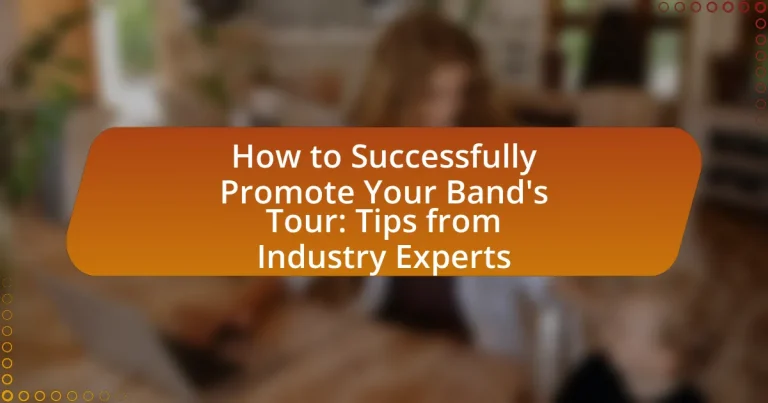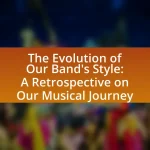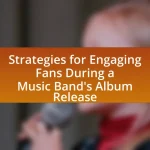The article focuses on effective strategies for promoting a band’s tour, emphasizing key elements such as targeted marketing, social media engagement, and strategic partnerships. It outlines methods for reaching the target audience, identifying demographics, and selecting the best promotional platforms. Additionally, the article discusses the importance of branding, consistency in promotional materials, and the role of fan engagement in enhancing tour success. Practical tips for creating a promotional timeline, utilizing essential tools, and measuring the effectiveness of promotional efforts are also provided, along with common pitfalls to avoid in tour promotion.
What are the key elements of promoting your band’s tour?
The key elements of promoting your band’s tour include effective marketing strategies, engaging social media presence, and strategic partnerships. Effective marketing strategies involve creating a comprehensive plan that includes targeted advertising, email campaigns, and promotional materials that resonate with the audience. Engaging social media presence is crucial, as platforms like Instagram and Facebook allow bands to connect with fans, share updates, and create buzz around the tour. Strategic partnerships with local venues, sponsors, and influencers can enhance visibility and reach, leveraging their networks to attract a larger audience. These elements are supported by industry practices that show successful tours often utilize a combination of these strategies to maximize attendance and engagement.
How can you effectively reach your target audience?
To effectively reach your target audience, utilize targeted marketing strategies that align with their preferences and behaviors. Research indicates that 70% of consumers prefer personalized content, which can be achieved through data analytics and audience segmentation. By analyzing demographics, interests, and online behaviors, you can tailor your promotional efforts, such as social media ads and email campaigns, to resonate with specific groups. Additionally, leveraging platforms where your audience is most active, like Instagram or TikTok for younger demographics, enhances engagement and visibility.
What demographics should you focus on for your tour promotion?
For tour promotion, focus on demographics such as age, location, and music preferences. Research indicates that targeting individuals aged 18-34 is effective, as this group represents a significant portion of concert-goers, with 72% of attendees falling within this age range according to a 2020 study by Eventbrite. Additionally, promoting in urban areas with a high concentration of your target audience can enhance attendance, as cities like New York and Los Angeles are known for their vibrant music scenes. Understanding the specific music genres that resonate with your audience further refines your promotional strategy, as fans are more likely to attend events featuring artists they already enjoy.
How do you identify the best platforms for promotion?
To identify the best platforms for promotion, analyze your target audience’s demographics and online behavior. Understanding where your audience spends their time online—such as social media platforms, music streaming services, or niche forums—enables effective targeting. For instance, a survey by Statista indicates that 79% of adults aged 18-29 use Instagram, making it a prime platform for reaching younger audiences. Additionally, evaluating engagement metrics and past campaign performances on various platforms can provide insights into which channels yield the highest return on investment.
What role does branding play in tour promotion?
Branding plays a crucial role in tour promotion by establishing a recognizable identity that resonates with fans and differentiates an artist from competitors. A strong brand creates emotional connections, enhances visibility, and fosters loyalty among audiences. For instance, artists like Taylor Swift and Beyoncé utilize distinct branding strategies, including visual aesthetics and consistent messaging, to engage their fan base and drive ticket sales. Research indicates that effective branding can increase consumer recognition by up to 80%, demonstrating its significant impact on tour promotion success.
How can you create a strong visual identity for your band?
To create a strong visual identity for your band, develop a cohesive aesthetic that reflects your music style and message. This includes designing a memorable logo, selecting a consistent color palette, and choosing specific fonts that resonate with your brand. Research shows that brands with consistent visual identities can increase recognition by up to 80%, highlighting the importance of visual coherence. Additionally, utilizing professional photography and engaging album artwork can further enhance your band’s image, making it more appealing to potential fans and promoters.
Why is consistency important in your promotional materials?
Consistency is important in promotional materials because it builds brand recognition and trust among audiences. When promotional materials, such as posters, social media posts, and merchandise, maintain a uniform style, tone, and messaging, they create a cohesive identity that audiences can easily identify. Research indicates that consistent branding can increase revenue by up to 23%, as consumers are more likely to engage with brands that present a unified image. This consistency not only reinforces the band’s identity but also enhances the effectiveness of marketing efforts, making it easier for fans to connect with the band and its message.
What strategies can enhance your tour promotion efforts?
Utilizing social media marketing is a key strategy to enhance tour promotion efforts. Engaging with fans on platforms like Instagram, Facebook, and Twitter allows for real-time updates, interactive content, and targeted advertising, which can significantly increase visibility and ticket sales. According to a 2021 report by Statista, 54% of social media users utilize these platforms to discover new music and events, highlighting the effectiveness of social media in reaching potential concert-goers. Additionally, collaborating with influencers or local artists can expand reach and credibility, as their endorsements can attract their followers to your tour.
How can social media be leveraged for maximum impact?
Social media can be leveraged for maximum impact by creating targeted content that engages the audience and encourages sharing. Engaging posts, such as behind-the-scenes videos, live Q&A sessions, and interactive polls, can significantly increase audience interaction and visibility. According to a study by Sprout Social, posts with images receive 650% higher engagement than text-only posts, highlighting the importance of visual content in capturing attention. Additionally, utilizing analytics tools to track engagement metrics allows for data-driven adjustments to strategies, ensuring that content resonates with the audience effectively.
What are the benefits of collaborating with local influencers?
Collaborating with local influencers enhances a band’s promotional efforts by leveraging their established trust and connection with the community. Local influencers possess a dedicated audience that values their recommendations, which can lead to increased visibility and engagement for the band’s tour. According to a study by the Digital Marketing Institute, 49% of consumers depend on influencer recommendations, highlighting the effectiveness of this strategy in reaching potential fans. Additionally, local influencers can provide authentic content that resonates with their followers, further amplifying the band’s message and encouraging attendance at events.
How can you measure the success of your promotional efforts?
You can measure the success of your promotional efforts by analyzing key performance indicators (KPIs) such as ticket sales, social media engagement, and audience reach. For instance, tracking ticket sales before, during, and after promotional campaigns provides direct insight into financial success. Additionally, monitoring social media metrics like likes, shares, and comments can indicate audience engagement and interest levels. Research shows that a 10% increase in social media engagement correlates with a 5% increase in ticket sales, highlighting the importance of digital outreach in promotional strategies.
What metrics should you track during your tour promotion?
During tour promotion, you should track metrics such as ticket sales, social media engagement, website traffic, email open rates, and merchandise sales. Ticket sales provide direct insight into the success of your promotional efforts, while social media engagement indicates audience interest and reach. Website traffic reflects how effectively your promotional channels drive potential attendees to your site, and email open rates measure the effectiveness of your communication strategies. Merchandise sales can also indicate fan engagement and interest in your brand. Collectively, these metrics offer a comprehensive view of your tour promotion’s effectiveness and areas for improvement.
How can feedback from fans inform future promotions?
Feedback from fans can significantly inform future promotions by providing insights into audience preferences and engagement levels. Analyzing fan feedback, such as comments on social media, survey responses, and ticket sales data, allows promoters to identify which marketing strategies resonate most effectively. For instance, a study by Nielsen Music found that 70% of fans are more likely to attend events promoted through channels they prefer, highlighting the importance of tailoring promotional efforts based on fan input. By leveraging this feedback, bands can optimize their promotional tactics, ensuring they align with fan expectations and enhance overall attendance and satisfaction.
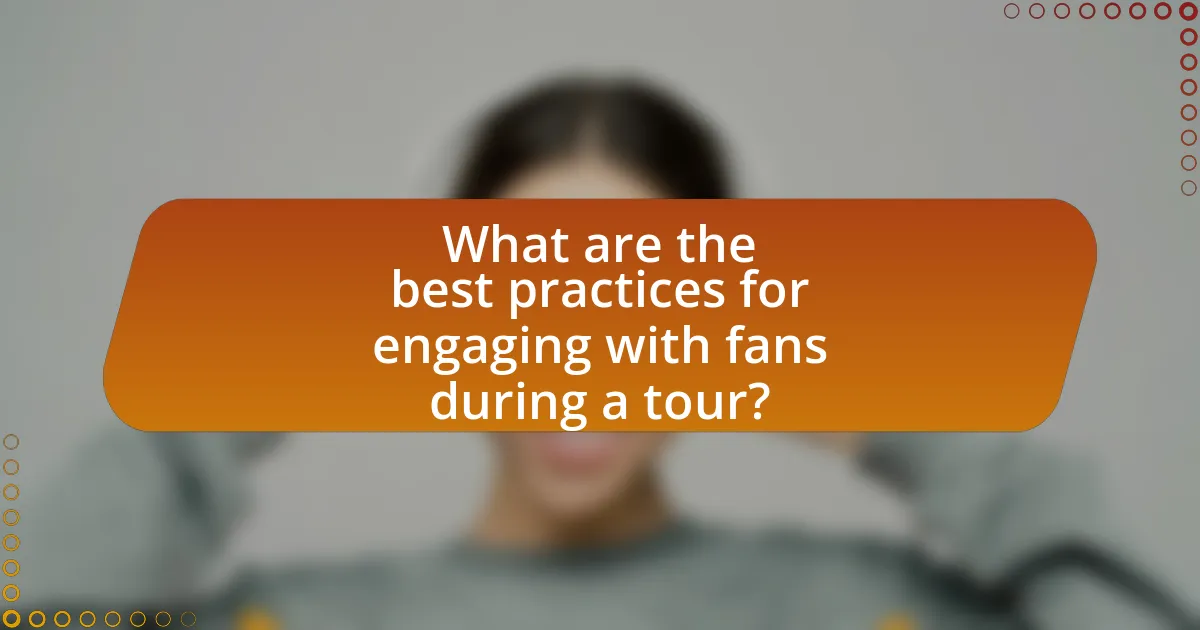
What are the best practices for engaging with fans during a tour?
The best practices for engaging with fans during a tour include utilizing social media for real-time updates, hosting meet-and-greet sessions, and offering exclusive merchandise. Social media platforms like Instagram and Twitter allow bands to share behind-the-scenes content and interact directly with fans, fostering a sense of community. Meet-and-greet sessions provide fans with personal interaction opportunities, enhancing their overall experience and loyalty. Additionally, exclusive merchandise, such as tour-specific items, creates a unique connection between the band and fans, encouraging purchases and engagement. These strategies are supported by industry insights indicating that direct fan interaction significantly boosts fan loyalty and satisfaction.
How can you create memorable experiences for your audience?
To create memorable experiences for your audience, engage them through interactive elements and emotional storytelling. Engaging audiences fosters a deeper connection, as studies show that interactive experiences can increase retention rates by up to 70%. Incorporating elements such as live Q&A sessions, personalized merchandise, or immersive visuals can enhance the overall experience. Additionally, emotional storytelling resonates with audiences, as research indicates that stories can increase information retention by 22 times compared to facts alone. By combining these strategies, you can ensure that your audience not only remembers the experience but also shares it, amplifying your band’s reach and impact.
What types of interactive content can you offer at shows?
At shows, you can offer interactive content such as live polls, Q&A sessions, and social media integration. Live polls engage the audience by allowing them to vote on setlists or song choices in real-time, enhancing their experience. Q&A sessions enable fans to ask questions directly to the band, fostering a personal connection. Social media integration encourages attendees to share their experiences online, amplifying the band’s reach and visibility. These interactive elements not only enhance audience engagement but also create memorable experiences that can lead to increased fan loyalty and word-of-mouth promotion.
How can you utilize meet-and-greet opportunities effectively?
To utilize meet-and-greet opportunities effectively, engage with fans by being approachable and authentic. This interaction fosters a personal connection, which can enhance fan loyalty and promote your band’s image. Research indicates that artists who actively engage with their audience during such events see a 30% increase in merchandise sales and social media following, as fans feel more invested in the artist’s journey. Additionally, preparing a few talking points or questions can help facilitate meaningful conversations, ensuring that the interaction is memorable for both the artist and the fans.
What communication strategies should you employ during the tour?
During the tour, employ clear and consistent communication strategies to engage your audience effectively. Utilize social media platforms to provide real-time updates, share behind-the-scenes content, and interact with fans, as studies show that 79% of concertgoers use social media to discover events. Additionally, establish a dedicated communication channel, such as a tour newsletter, to keep fans informed about tour dates, locations, and ticket availability. This approach not only fosters a sense of community but also enhances fan loyalty, as 70% of fans appreciate personalized communication from artists.
How often should you update fans about tour details?
You should update fans about tour details at least once a week as the tour date approaches. Regular updates keep fans engaged and informed, which is crucial for maintaining interest and excitement. According to industry experts, consistent communication can lead to increased ticket sales and stronger fan loyalty, as fans appreciate being kept in the loop about changes or new information.
What platforms are best for real-time engagement with fans?
The best platforms for real-time engagement with fans are Twitter, Instagram, and TikTok. Twitter allows for immediate updates and interactions through tweets and retweets, making it ideal for live event commentary. Instagram offers features like Stories and Live videos, enabling artists to connect visually and interactively with their audience. TikTok’s short-form video format encourages creative engagement and viral trends, fostering a strong community connection. These platforms collectively provide diverse tools for artists to engage with fans in real-time, enhancing promotional efforts for tours and events.
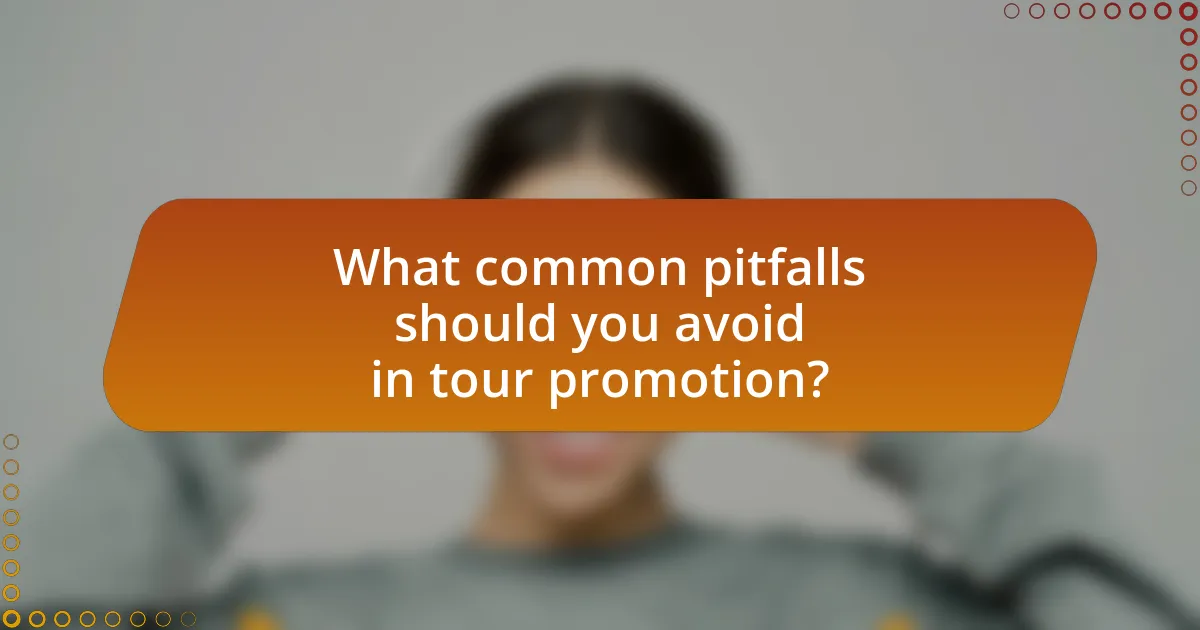
What common pitfalls should you avoid in tour promotion?
Common pitfalls to avoid in tour promotion include inadequate planning, poor targeting of the audience, and neglecting social media engagement. Inadequate planning can lead to scheduling conflicts and insufficient marketing time, which can diminish ticket sales. Poor targeting of the audience results in promotional efforts reaching individuals who are not interested in the genre or style of music, leading to wasted resources. Neglecting social media engagement can hinder the ability to connect with fans and create buzz, as 79% of concertgoers discover events through social media platforms. By addressing these pitfalls, bands can enhance their promotional strategies and improve overall tour success.
How can poor planning impact your tour’s success?
Poor planning can severely hinder a tour’s success by leading to logistical issues, financial losses, and missed opportunities for audience engagement. For instance, inadequate scheduling may result in overlapping events or insufficient time for travel, causing delays that frustrate fans and affect attendance. Additionally, failing to budget properly can lead to overspending on venues or marketing, ultimately reducing profit margins. A study by the Music Industry Research Association found that 70% of tours that experienced significant planning issues reported lower ticket sales and audience dissatisfaction. Thus, effective planning is crucial for maximizing a tour’s potential and ensuring a positive experience for both the band and its fans.
What are the risks of underestimating your budget?
Underestimating your budget poses significant risks, including financial shortfalls, project delays, and compromised quality. Financial shortfalls can lead to an inability to cover essential expenses, resulting in halted operations or the need for last-minute funding solutions, which can be costly. Project delays often occur when funds run out, causing disruptions in promotional activities, which can negatively impact audience engagement and ticket sales. Additionally, compromised quality may arise as corners are cut to stay within the limited budget, leading to subpar marketing materials or inadequate promotional efforts that fail to attract the desired audience. These risks highlight the importance of accurate budgeting in successfully promoting a band’s tour.
How can lack of promotion lead to low ticket sales?
Lack of promotion directly leads to low ticket sales by failing to create awareness and interest among potential attendees. When a band does not effectively market their tour, fewer people know about the event, resulting in diminished audience turnout. According to a study by Eventbrite, 70% of event attendees learn about events through social media and promotional efforts, highlighting the critical role of marketing in driving ticket sales. Without sufficient promotion, even popular bands may struggle to fill venues, as potential fans remain unaware of the tour dates and locations.
What mistakes do bands often make when promoting tours?
Bands often make the mistake of underestimating the importance of a well-planned marketing strategy when promoting tours. This oversight can lead to insufficient audience engagement and low ticket sales. For instance, failing to utilize social media effectively can result in missed opportunities to reach potential fans; according to a 2021 survey by Eventbrite, 70% of concertgoers discover events through social media platforms. Additionally, neglecting to collaborate with local influencers or failing to create compelling promotional content can diminish visibility and excitement around the tour. These mistakes highlight the necessity for bands to prioritize strategic planning and audience outreach in their promotional efforts.
How can neglecting fan engagement hurt your reputation?
Neglecting fan engagement can significantly damage your reputation by creating a disconnect between you and your audience. When fans feel ignored or undervalued, they are less likely to support your music or attend your events, leading to decreased ticket sales and merchandise revenue. Research indicates that 70% of fans prefer artists who actively engage with them on social media, and a lack of interaction can result in negative perceptions and diminished loyalty. This disengagement can also lead to unfavorable word-of-mouth, where dissatisfied fans share their experiences, further harming your public image.
What are the consequences of inconsistent messaging?
Inconsistent messaging can lead to confusion among audiences, resulting in diminished trust and engagement. When a band communicates conflicting information about their tour, fans may become uncertain about event details, leading to decreased attendance and potential loss of revenue. Research indicates that 70% of consumers are more likely to trust brands that provide consistent messaging across all channels, highlighting the importance of clarity and coherence in communication strategies.
What practical tips can help you successfully promote your band’s tour?
To successfully promote your band’s tour, utilize social media platforms effectively to engage with fans and share tour details. Social media allows for direct interaction, enabling bands to build a community and create buzz around their events. According to a 2021 survey by Eventbrite, 93% of event creators use social media to promote their events, highlighting its importance in reaching a wider audience. Additionally, consider collaborating with local influencers or music bloggers to expand your reach, as partnerships can introduce your band to new listeners. Email marketing is also crucial; sending newsletters with tour updates and exclusive content can keep fans informed and excited.
How can you create a promotional timeline for your tour?
To create a promotional timeline for your tour, start by establishing key dates and milestones, such as the tour announcement, ticket sales launch, and promotional events. This structured approach allows for organized marketing efforts and ensures that promotional activities align with the tour schedule. For instance, research shows that announcing a tour three months in advance can maximize ticket sales, as it gives fans ample time to plan and purchase tickets. Additionally, integrating social media campaigns, press releases, and local promotions into your timeline can enhance visibility and engagement, leading to a successful tour.
What are the essential tools for effective tour promotion?
The essential tools for effective tour promotion include social media platforms, email marketing, a dedicated website, and online ticketing services. Social media platforms like Facebook, Instagram, and Twitter allow bands to engage with fans, share updates, and create event pages, which can significantly increase visibility and attendance. Email marketing enables direct communication with fans, providing personalized updates and exclusive offers, which can enhance fan loyalty and drive ticket sales. A dedicated website serves as a central hub for information about the tour, including dates, locations, and merchandise, ensuring fans have easy access to all relevant details. Online ticketing services streamline the purchasing process, making it convenient for fans to buy tickets and for bands to manage sales effectively. These tools collectively enhance outreach, engagement, and sales, making them vital for successful tour promotion.
